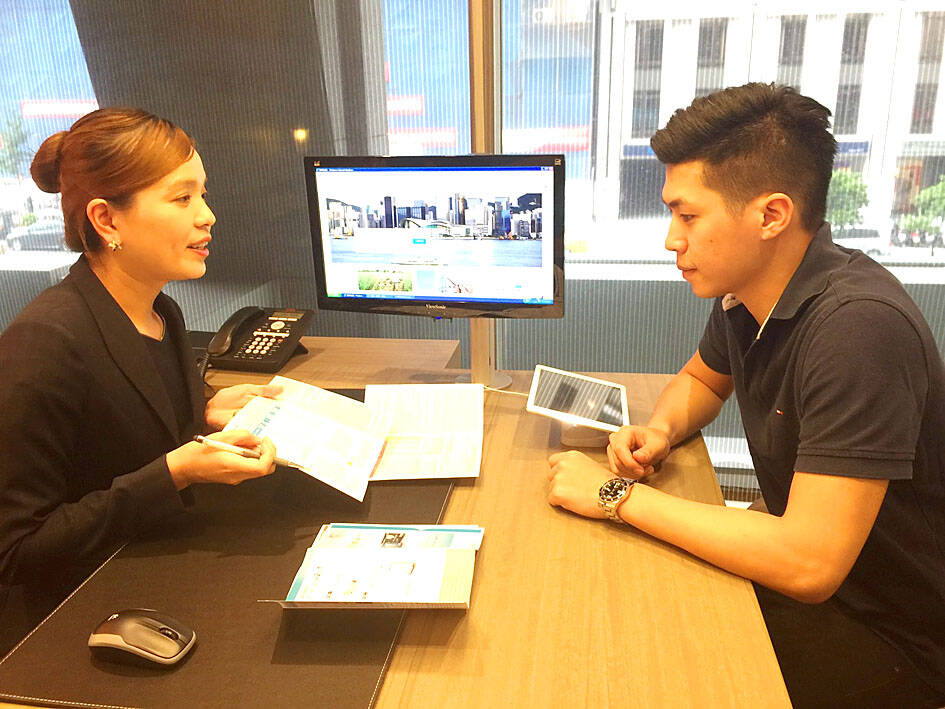UBS Group AG is maintaining fund flows at its Taiwan wealth unit and expects double-digit percentage growth this year, even as tensions with China spook investors.
While some clients are transferring assets to financial centers such as Switzerland or Hong Kong, others are reconfiguring their portfolios and bringing funds back to Taiwan, said Henry Su (蘇韋毓), head of wealth management for UBS in Taiwan.
In addition to geopolitics, clients are considering intergenerational wealth transfers and supply-chain issues, he said.

Photo: Liao Chien-ying, Taipei Times
“In the past, it’s much more about the S&P performance after one quarter,” he said, referring to the US benchmark stock index. “Now we see very different things on top of our clients’ minds, especially around those three trends.”
UBS Taiwan’s wealth management business is hoping to achieve double-digit percentage revenue growth this year, in line with business expectations. It plans to offer alternative investments, to which Taiwan clients have historically had little access, and focus more on onshore banking for the nation’s economy.
“It’s important for us to get out of our comfort zone,” Su said in an interview in Taipei. “We are going to go even more local.”
UBS Taiwan has about 450 staff, and the firm expects that number to increase to more than 500 in the next five years, Su said.
Tensions with China are top of mind for investors, especially ahead of Taiwan’s presidential election next year.
Last year, global financial firms asked staff to review contingency plans, while local banks have slashed their exposure to China to the lowest level in at least a decade.
At the same time, Taiwanese businesses have significantly reduced their new investments in China as they diversify manufacturing locations.
For second or third-generation business owners, assuming they still consider Taiwan home, the families have to consolidate their overseas wealth back to Taiwan to plan for intergenerational wealth transfers, Su said.
Last month, China’s People’s Liberation Army (PLA) completed three days of military exercises around Taiwan after President Tsai Ing-wen (蔡英文) met US House of Representatives Speaker Kevin McCarthy in California.
Last year, the PLA nearly doubled the number of military flights around Taiwan to more than 1,700.
“Some clients reacted strongly and transferred their funds elsewhere, while some just asked: ‘What do you think and how should they plan for it?’” said Su of the reaction to the military drills.
Despite geopolitical concerns, banks have been expanding their wealth services in Taiwan amid a regulatory push. HSBC Holdings PLC recently opened new wealth management centers, while the Financial Supervisory Commission has been approving more local banks to provide services to high-net-worth clients.

Merida Industry Co (美利達) has seen signs of recovery in the US and European markets this year, as customers are gradually depleting their inventories, the bicycle maker told shareholders yesterday. Given robust growth in new orders at its Taiwanese factory, coupled with its subsidiaries’ improving performance, Merida said it remains confident about the bicycle market’s prospects and expects steady growth in its core business this year. CAUTION ON CHINA However, the company must handle the Chinese market with great caution, as sales of road bikes there have declined significantly, affecting its revenue and profitability, Merida said in a statement, adding that it would

Greek tourism student Katerina quit within a month of starting work at a five-star hotel in Halkidiki, one of the country’s top destinations, because she said conditions were so dire. Beyond the bad pay, the 22-year-old said that her working and living conditions were “miserable and unacceptable.” Millions holiday in Greece every year, but its vital tourism industry is finding it harder and harder to recruit Greeks to look after them. “I was asked to work in any department of the hotel where there was a need, from service to cleaning,” said Katerina, a tourism and marketing student, who would

i Gasoline and diesel prices at fuel stations are this week to rise NT$0.1 per liter, as tensions in the Middle East pushed crude oil prices higher last week, CPC Corp, Taiwan (台灣中油) and Formosa Petrochemical Corp (台塑石化) said yesterday. International crude oil prices last week rose for the third consecutive week due to an escalating conflict between Israel and Iran, as the market is concerned that the situation in the Middle East might affect crude oil supply, CPC and Formosa said in separate statements. Front-month Brent crude oil futures — the international oil benchmark — rose 3.75 percent to settle at US$77.01

RISING: Strong exports, and life insurance companies’ efforts to manage currency risks indicates the NT dollar would eventually pass the 29 level, an expert said The New Taiwan dollar yesterday rallied to its strongest in three years amid inflows to the nation’s stock market and broad-based weakness in the US dollar. Exporter sales of the US currency and a repatriation of funds from local asset managers also played a role, said two traders, who asked not to be identified as they were not authorized to speak publicly. State-owned banks were seen buying the greenback yesterday, but only at a moderate scale, the traders said. The local currency gained 0.77 percent, outperforming almost all of its Asian peers, to close at NT$29.165 per US dollar in Taipei trading yesterday. The